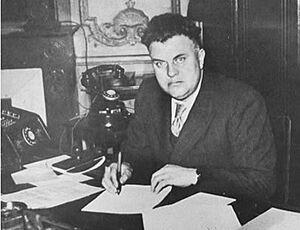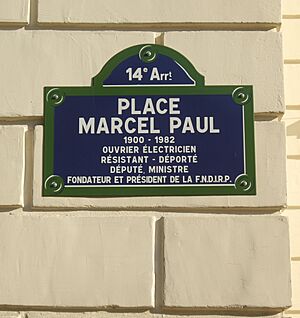Marcel Paul facts for kids
Quick facts for kids
Marcel Paul
|
|
|---|---|
 |
|
| Député | |
| In office 1945–1948 |
|
| Constituency | Haute-Vienne |
| Personal details | |
| Born | 12 July 1900 Paris, France |
| Died | November 11, 1982 (aged 82) Paris, France |
| Political party | French Communist Party (PCF) |
Marcel Paul (born July 12, 1900 – died November 11, 1982) was a French leader for workers' rights and a politician who believed in communism. He survived a Nazi concentration camp and later became a member of the French parliament, helping to shape France after World War II.
Contents
Marcel Paul's Early Life and Activism
Marcel Paul was found as a baby on July 12, 1900, in Paris. This day became his birthday. He started working at age 13. By age 15, he was already active in politics, speaking out against World War I.
He joined the navy as a young man. While serving, he supported striking workers at a power station in Saint-Nazaire. After leaving the navy, he became an electrician in Paris. In 1923, he left the French socialist party. In 1927, he joined the French Communist Party (PCF). He also kept his strong connections with trade unions, which are groups that protect workers' rights.
Fighting in World War II
In 1939, Marcel Paul joined the army when World War II began. He was captured by the Nazis but managed to escape. He fled to Brittany, where he connected with the French Communist Party and its local leader. Together, they helped create a branch of the party to join the French Resistance. The Resistance was a secret movement fighting against the Nazi occupation of France.
In November 1940, Paul returned to Paris. He led a secret group called the Organisation Spéciale (Special Organization). This group later became known as FTP-MOI, which was a part of the Resistance.
Capture and Survival in Concentration Camps
Marcel Paul planned an attack against a high-ranking Nazi official, but it did not succeed. He was reported to the authorities and arrested on November 13, 1941. He was tortured by the police in Saint-Denis.
He was held in different prisons before being handed over to the Germans. He was then sent to Auschwitz concentration camp and later to Buchenwald concentration camp. These were terrible places where many people were held captive and suffered. While at Buchenwald, Marcel Paul took part in a brave uprising in April 1945. He also helped save the lives of many other prisoners. One person he helped was a businessman named Marcel Dassault. Dassault later became an important supporter of the PCF newspaper L'Humanité.
After the war, Marcel Paul spoke at the celebrations for the liberation of Buchenwald.
Political Career After the War
After France was freed from Nazi control, Marcel Paul became a government minister. He was the Minister of Industrial Production in the temporary government led by Charles de Gaulle.
On April 8, 1946, he helped make a big change for France. He voted for the government to take control of electricity and natural gas companies. This led to the creation of Électricité de France (EDF) and Gaz de France (GDF), which still provide power and gas to homes and businesses today.
Marcel Paul was a representative for the PCF in the Haute-Vienne region. He served in the French National Assembly, which is like the French parliament, from 1945 to 1948. He was also a member of the Central Committee of the PCF from 1945 to 1964.
In April 1982, Marcel Paul was honored with the Legion of Honour, a very important French award. He passed away at his home on November 11, 1982, just hours after attending a ceremony in Paris.
Marcel Paul's Lasting Legacy
Marcel Paul is remembered in France in many ways. A large hall in Saint-Denis, used by workers' groups, is named after him. Many streets, avenues, squares, and even tramway stations in different French cities also bear his name. One such place is in the 14th district of Paris, where he was found as a baby.
A special monument has been built to honor him near the Flamanville nuclear power plant. In 1992, the French Post Office even released a postage stamp to pay tribute to his memory.
 | Sharif Bey |
 | Hale Woodruff |
 | Richmond Barthé |
 | Purvis Young |


